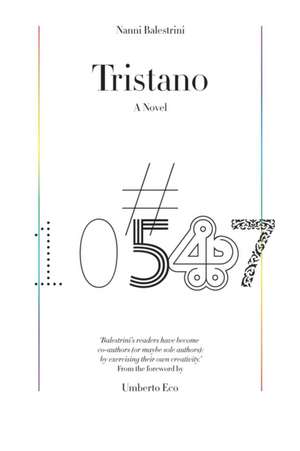Tristano
Autor Nanni Balestrinien Limba Engleză Paperback – 26 ian 2014
The story involves two lovers, there is disruption on the streets of Milan, protesters by Porta Ticinese. Can they escape and be together? How will events change their destiny? In Tristano, Nanni Balestrini brilliantly experiments with form and storytelling to create a new type of novel in which technology, author and the reader themselves collaborate to create the narrative. Constructed of ten chapters, each consisting of twenty texts taken from guidebooks, atlases, newspapers and fiction, each printed edition of the novel is ordered uniquely.
Preț: 100.15 lei
Nou
Puncte Express: 150
Preț estimativ în valută:
19.17€ • 19.94$ • 15.82£
19.17€ • 19.94$ • 15.82£
Cartea se retipărește
Doresc să fiu notificat când acest titlu va fi disponibil:
Se trimite...
Preluare comenzi: 021 569.72.76
Specificații
ISBN-13: 9781781681695
ISBN-10: 1781681694
Pagini: 120
Dimensiuni: 137 x 208 x 10 mm
Greutate: 0.16 kg
Editura: VERSO
ISBN-10: 1781681694
Pagini: 120
Dimensiuni: 137 x 208 x 10 mm
Greutate: 0.16 kg
Editura: VERSO
Notă biografică
Nanni Balestrini is a poet and novelist, cultural and political activist. He began publishing his poetry in the early 1950s and wrote his first computer-aided poem Tape Mark I in 1961. In 1973, he joined the movement Autonomia Operaia and on April 7, 1979 was accused of subversive association and involvement in 19 murders, including Aldo Moro. He took refuge in Paris until the charges were dropped. His novel, The Unseen, is also available from Verso.
Recenzii
“Goodbye Gutenberg. Many alternative ways of spreading the adventure of literature are emerging. This exercise by Balestrini is absolutely central.”—La Stampa
“Finally the historical impasse between literature and new media ... turns into an opportunity to create something radically new.”—Aldo Nove, Il Sole 24 Ore
“Balestrini has created with Tristano a kind of poetry of the language ... promoting language to the role of protagonist, that is of hero, and where in traditional novels language voices the hero’s thoughts and actions, in this new Tristano language voices itself and celebrates its The Unseen wide number of opportunities and movements.”—Angelo Guglielmi, L’Unità
"Goodbye Gutenberg. Many alternative ways of spreading the adventure of literature are emerging. This exercise by Balestrini is absolutely central." La Stampa "Finally the historical impasse between literature and new media ... turns into an opportunity to create something radically new." Aldo Nove, Il Sole 24 Ore "Balestrini has created with Tristano a kind of poetry of the language ... promoting language to the role of protagonist, that is of hero, and where in traditional novels language voices the hero's thoughts and actions, in this new Tristano language voices itself and celebrates its wide number of opportunities and movements." Angelo Guglielmi, L'Unità
“Finally the historical impasse between literature and new media ... turns into an opportunity to create something radically new.”—Aldo Nove, Il Sole 24 Ore
“Balestrini has created with Tristano a kind of poetry of the language ... promoting language to the role of protagonist, that is of hero, and where in traditional novels language voices the hero’s thoughts and actions, in this new Tristano language voices itself and celebrates its The Unseen wide number of opportunities and movements.”—Angelo Guglielmi, L’Unità
"Goodbye Gutenberg. Many alternative ways of spreading the adventure of literature are emerging. This exercise by Balestrini is absolutely central." La Stampa "Finally the historical impasse between literature and new media ... turns into an opportunity to create something radically new." Aldo Nove, Il Sole 24 Ore "Balestrini has created with Tristano a kind of poetry of the language ... promoting language to the role of protagonist, that is of hero, and where in traditional novels language voices the hero's thoughts and actions, in this new Tristano language voices itself and celebrates its wide number of opportunities and movements." Angelo Guglielmi, L'Unità
